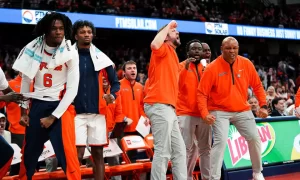Virtual game nights have exploded in popularity, offering a simple way for people to connect no matter where they are.
Friends, families, and entire communities are logging on to unwind, laugh, and share moments together—even when miles apart.
This article digs into what’s behind the rise of online game nights.
You’ll discover how influencers and technology have turned digital hangouts into dynamic events that go beyond just playing games—they’re shaping new cultures of fun and connection.
Ready to find out why everyone’s joining the party online?
Casino Influencers and the Rise of Virtual Game Nights
Casino influencers are changing how we think about socializing online.
Instead of gathering around a kitchen table or meeting at a local bar, people now join virtual game nights hosted by charismatic streamers.
These digital hosts have transformed what was once a solo pastime into an interactive group experience.
Platforms like dicegirl.casino lead the way, turning every stream into a vibrant hangout where viewers aren’t just spectators—they’re part of the action.
The appeal is clear: fans can chat live, react to every spin or hand, and even influence the flow of play through polls and suggestions.
This level of interactivity bridges the gap between entertainment and genuine connection, creating a shared atmosphere that rivals in-person gatherings.
For many, these streams offer more than just excitement—they become weekly rituals where friendships form and inside jokes develop over time.
The energy of celebrating wins together (or commiserating on near-misses) makes each session feel like a real event rather than just another night online.
Key Takeaway: Casino influencers have redefined virtual game nights, making them lively hubs for community and connection—no travel or crowded rooms required.
The Social Shift: Why We Prefer Virtual Game Nights
Virtual game nights have quickly moved beyond being just a fun way to pass the time.
They’ve become a lifeline for meaningful connection, offering the sense of togetherness that busy schedules and physical distance often make difficult.
Digital hangouts remove travel barriers and blend flexibility with spontaneity.
What’s more, their inclusive nature means everyone has a seat at the table—regardless of geography, time zone, or ability.
This new way of socializing isn’t just convenient; it taps into our desire for community and shared experiences, making virtual game nights a staple in modern life.
Convenience and Accessibility for All
One of the biggest draws of virtual game nights is how effortlessly people can join in.
There’s no need to coordinate travel or find a common meeting spot—everyone simply logs on from wherever they are.
This convenience makes it possible for friends scattered across cities (or even continents) to connect regularly.
For those with mobility challenges or demanding schedules, digital platforms offer a level playing field where everyone participates equally.
Pro Tip: Scheduling apps and calendar integrations can help groups lock in regular game nights that actually happen.
A Safe and Welcoming Space
Online game nights create an environment where people feel comfortable engaging at their own pace.
The pressure to dress up or perform socially is lower than in-person gatherings, which helps introverts and newcomers feel more relaxed.
With customizable settings—such as private rooms or invite-only sessions—hosts can easily foster safe spaces tailored to their group’s needs.
This atmosphere encourages open conversation and genuine interaction without many of the anxieties found in traditional settings.
Inclusivity and Diverse Communities
Virtual hangouts naturally attract people from all walks of life, creating spaces where diverse perspectives flourish.
This inclusivity leads to unique friendships that might not have formed in local circles alone.
Diversity in Gaming Communities, a 2024 article, highlights how online gaming fosters empathy and breaks down stereotypes among players from various backgrounds. It shows that shared play helps build social capital and mutual understanding across cultural lines.
Key Takeaway: Digital game nights aren’t just about games—they’re about building richer, more connected communities for everyone involved.
Influencers as Hosts: Creating Community and Connection
Influencers are at the heart of today’s virtual game nights, turning digital gatherings into vibrant, engaging communities.
With creative hosting styles and authentic personalities, streamers shape online experiences that go far beyond simply playing games—they build loyal audiences who keep coming back for connection and fun.
Even traditional game formats are evolving to support this trend. For example, Tom Horn Gaming has embraced social play by powering influencer-hosted slot tournaments, where streamers engage live audiences, compete on leaderboards, and foster real-time excitement.
These events blur the line between solo slot play and communal entertainment.
Let’s look at how these hosts make game nights more meaningful through shared rituals, active participation, and safe spaces for everyone.
Building Rituals and Shared Experiences
The best streamers know that community is built on shared habits. Recurring streams—like a Friday slots night or monthly themed tournaments—give viewers something to look forward to each week.
Inside jokes and playful traditions emerge naturally when people gather regularly. Over time, these small rituals turn anonymous chats into close-knit circles where everyone feels like they belong.
For many fans, tuning in isn’t just about the games—it’s about being part of a tradition with friends they’ve made online. Think of it as your local pub quiz night, but with global reach and digital flair.
Key Takeaway: Rituals help transform virtual sessions into memorable events that foster loyalty and belonging.
Audience Participation and Co-Op Play
The magic of digital game nights comes alive when viewers become participants, not just spectators. Features like live chat let fans cheer each other on or offer tips during tense moments.
Polls let the audience vote on game choices or strategy moves in real time. Many streamers take this further by inviting viewers to join co-op games, trivia battles, or team challenges right on stream.
This level of interaction turns every session into a collaborative experience—everyone’s involved, whether they’re calling shots from the chat or playing side by side with their favorite host.
Pro Tip: Regularly invite new viewers to join in—it builds trust and keeps your community fresh.
Moderation and Safe Spaces
A thriving virtual game night relies on respect and inclusion. That’s why skilled moderators are essential for keeping chats positive and welcoming for all participants.
The 2024 study Moderation in Online Communities highlights that active moderation reduces toxic behavior while protecting vulnerable members of online groups.
This allows diverse communities to flourish without fear of harassment or exclusion—making every digital hangout feel like a safe place to relax and connect.
Key Takeaway: Thoughtful moderation is the backbone of any inclusive streaming community, ensuring fun stays front and center for everyone involved.
The Future of Virtual Game Nights: Trends and Challenges
Immersive Technologies and Next-Gen Interactivity
Virtual game nights are poised for a major leap forward as new technologies hit the mainstream.
Virtual reality (VR) headsets, augmented reality (AR) overlays, and advanced streaming tools are transforming what it means to “hang out” online.
Picture gathering around a virtual poker table or joining a trivia contest with friends’ avatars in lifelike 3D—no plane ticket or commute needed.
According to the AR/VR Adoption Forecast, social platform use of AR and VR is rising year over year, with user numbers projected to grow steadily through 2028.
This shift promises deeper engagement and richer social experiences in digital gaming spaces.
Balancing Screen Time and Social Connection
As virtual game nights become more immersive, finding the right balance between screen time and authentic connection matters more than ever.
The convenience of joining friends from anywhere can sometimes lead to longer sessions or even social fatigue if boundaries aren’t set.
Many users are now adopting habits like scheduling regular breaks or mixing online gatherings with offline meetups whenever possible.
The challenge going forward is clear: how do we keep digital hangouts fun and meaningful without letting them replace in-person interactions altogether?
Pro Tip: Set time limits for online sessions or create themed nights that encourage everyone to log off at a set hour—your future self will thank you!
Conclusion
Virtual game nights aren’t just a passing trend—they’re the new social standard. Technology, creativity, and community have combined to make digital hangouts accessible, fun, and deeply engaging.
As platforms evolve and influencers bring fresh energy to every stream, these online gatherings are only becoming more interactive and inclusive. What started as a simple way to connect from afar has grown into a vibrant social hub for people everywhere.
The future of socializing is here—and it’s happening online, one virtual game night at a time.


















